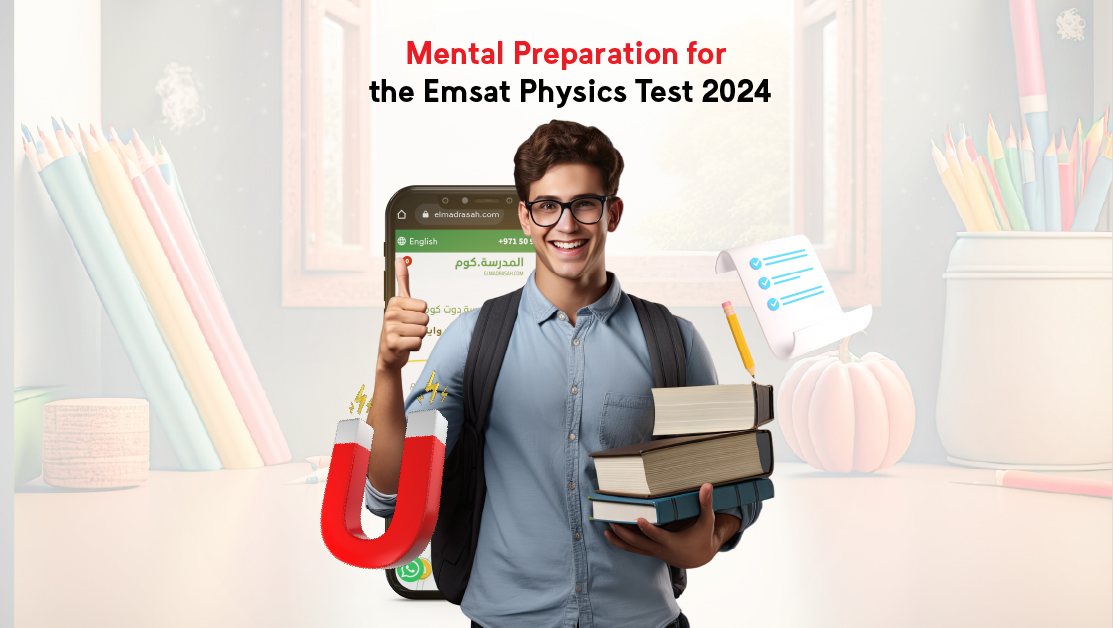
The Emsat Physics test is a crucial component of the college admissions process, particularly for students in Abu Dhabi. This standardized test assesses a student’s understanding of physics concepts and their ability to apply them in various contexts. To excel in the Emsat Physics test, it’s essential to not only have a solid grasp of the subject matter but also to be mentally prepared for the challenges it presents. In this article, we will discuss effective strategies for mental preparation, including the role of Elmadrasah.com courses in enhancing your readiness for the test.
Understanding the Emsat Physics Test
Before delving into mental preparation strategies, let’s briefly outline the key aspects of the Emsat Physics test. The test consists of multiple-choice questions that cover a range of topics in physics, including mechanics, thermodynamics, electromagnetism, and optics. It is designed to assess a student’s knowledge of fundamental principles and their ability to solve problems using these principles.
Mental Preparation Strategies
- Set Clear Goals: Start by setting clear and achievable goals for your Emsat Physics test preparation. Define the score you want to achieve and break down your study plan accordingly.
- Create a Study Schedule: Develop a study schedule that allows you to cover all the necessary topics before the test date. Allocate specific times for studying different concepts and practicing sample questions.
- Practice Regularly: Consistent practice is key to success in the Emsat Physics test. Use Elmadrasah.com courses to access a wide range of practice questions and simulations to enhance your understanding of physics concepts.
- Focus on Weak Areas: Identify your weak areas and dedicate extra time to improving them. Use Elmadrasah.com courses to access targeted resources that can help you strengthen your understanding of these topics.
- Stay Positive: Maintain a positive mindset throughout your preparation. Believe in your abilities and stay motivated to achieve your goals.
- Manage Stress: The Emsat Physics test can be stressful, but it’s important to manage your stress levels effectively. Practice relaxation techniques such as deep breathing and mindfulness to stay calm and focused.
- Get Adequate Rest: Ensure you get enough rest before the test day. A well-rested mind performs better, so prioritize sleep in your preparation schedule.
Elmadrasah.com offers a range of courses that can enhance your preparation for the Emsat Physics test. These courses are designed by experienced educators and cover all the key topics tested in the exam.
Test Structure and Content Overview:
The EmSAT Physics test for 2024 is a comprehensive assessment that evaluates students’ understanding of various physics concepts across five major domains. Each domain covers specific topics essential for success in college-level physics courses.
- Mechanics: This domain focuses on the motion of objects, including translational and rotational motion, as well as fluid mechanics. Topics covered include kinematics, dynamics, Newton’s laws of motion, conservation laws, and properties of fluids.
- Waves and Optics: Here, students are tested on their knowledge of oscillations, mechanical and electromagnetic waves, and optics. Topics include simple harmonic motion, wave properties, interference, diffraction, and geometric optics principles.
- Thermal Physics and Thermodynamics: This domain examines students’ understanding of temperature, heat transfer, and thermodynamic laws. Topics include thermal equilibrium, heat transfer mechanisms, ideal gas laws, and concepts like entropy and energy conservation.
- Electricity and Magnetism: Covering static and current electricity, magnetism, and electromagnetism, this domain delves into electric charge, circuits, magnetic fields, and electromagnetic induction. Students are expected to understand the behavior of electric and magnetic phenomena.
- Modern Physics: This domain explores advanced concepts such as the theory of relativity, quantum physics, and nuclear physics. Topics include Einstein’s special theory of relativity, quantum mechanics, atomic models, and nuclear reactions.
Adaptive Testing Approach:
The EmSAT Physics test employs an adaptive approach, meaning the difficulty level of questions adjusts based on the test taker’s responses. Correct answers lead to more challenging questions, while incorrect answers result in easier ones. This adaptive method ensures that each test taker receives a tailored assessment aligned with their abilities, providing a more accurate measure of proficiency.
Test Duration and Task Types:
The EmSAT Physics test has a duration of 90 minutes, during which test takers must answer multiple-choice questions across the five content domains. The multiple-choice format requires students to select the correct answer from a set of options. Additionally, calculators are permitted during the exam to assist with mathematical calculations.
Scoring and Score Descriptors:
Test takers receive scores based on their performance, with score descriptors ranging from “High Proficiency” to “Little knowledge of basic science.” These descriptors provide detailed feedback on the test taker’s level of preparation and readiness for college-level physics courses.
Preparation Strategies:
To excel in the EmSAT Physics test, students should focus on developing a thorough understanding of physics principles across all content domains. Utilizing comprehensive study materials and resources such as Elmadrasah.com courses can enhance preparation by providing interactive lessons, practice questions, and simulation tools tailored to the exam’s content.
The EmSAT Physics test represents a rigorous evaluation of students’ physics knowledge and readiness for college-level coursework. By understanding the test’s structure, content areas, and scoring criteria, test takers can effectively prepare and maximize their performance on the exam, paving the way for success in their academic pursuits.
Summary of Physics Emsat
The EmSAT Physics test serves as a comprehensive evaluation tool, gauging students’ comprehension across diverse areas of physics essential for higher education. Here’s a Summary of Physics Emsat exam:
- Mechanics: This segment scrutinizes the fundamental principles governing motion, including translational and rotational motion, and fluid mechanics. It delves into topics like kinematics, dynamics, Newton’s laws of motion, and conservation laws, ensuring candidates are proficient in analyzing various motion scenarios.
- Waves and Optics: Candidates are tested on their grasp of oscillations, mechanical and electromagnetic waves, and optics principles. From understanding simple harmonic motion to exploring wave properties like interference and diffraction, this section demands a comprehensive understanding of wave behavior and optical phenomena.
- Thermal Physics and Thermodynamics: Focused on temperature, heat transfer mechanisms, and thermodynamic laws, this domain assesses students’ knowledge of thermal equilibrium, ideal gas laws, and entropy concepts. Mastery of heat transfer mechanisms, phase changes, and thermodynamic processes is essential for success.
- Electricity and Magnetism: Covering static and current electricity, magnetism, and electromagnetism, this segment evaluates students’ understanding of electric charge, circuits, magnetic fields, and electromagnetic induction. Proficiency in analyzing electric and magnetic phenomena and their applications is crucial.
- Modern Physics: Exploring advanced physics concepts, including relativity, quantum mechanics, and nuclear physics, this domain challenges candidates to comprehend Einstein’s theories, quantum phenomena, atomic models, and nuclear reactions. It requires a deep understanding of modern physics theories and their real-world implications.
The EmSAT Physics test employs an adaptive approach, tailoring question difficulty based on students’ responses to ensure a personalized assessment experience. It consists of multiple-choice questions, allowing candidates to select the correct answer from a set of options. Calculators are permitted during the exam to assist with mathematical calculations, enhancing efficiency and accuracy.
Upon completion, students receive scores indicating their proficiency level, ranging from “High Proficiency” to “Little knowledge of basic science.” These score descriptors offer detailed insights into students’ preparedness for college-level physics courses, guiding further academic endeavors.
This summary of physics Emsat should help students understand that to excel in the EmSAT Physics test, students should adopt comprehensive study strategies, including utilizing study materials, practicing with sample questions, and seeking assistance from resources like Elmadrasah.com courses. By honing their understanding of physics principles and mastering exam strategies, candidates can maximize their performance and achieve success in the EmSAT Physics test.
How do I pass the physics exam?
Students might ask themselves How do I pass the physics exam? To pass the physics exam, it’s essential to have a comprehensive study plan that covers all the necessary topics and gives you enough practice to feel confident on exam day. Here’s a detailed guide to help you prepare effectively:
- Understand the Exam Format: Start by familiarizing yourself with the exam format, including the types of questions (multiple-choice, short answer, problem-solving), the weighting of different sections, and the time allotted for each section. This will help you tailor your study plan accordingly.
- Review Key Concepts: Physics is based on a few fundamental principles and equations. Make sure you have a strong grasp of these concepts, such as Newton’s laws of motion, conservation laws (energy, momentum), and the basic laws of thermodynamics. Understanding these principles will make it easier to tackle more complex problems.
- Practice Regularly: Physics is a subject that requires practice. Work through as many problems as you can to improve your problem-solving skills and gain a deeper understanding of the material. Start with simpler problems and gradually move on to more challenging ones.
- Use Resources Wisely: Utilize a variety of resources to supplement your learning. Textbooks, online lectures, and educational websites can provide different perspectives on the same material, helping you understand complex concepts better.
- Seek Clarification: Don’t hesitate to ask your teacher or peers for help if you’re struggling with a particular concept. Sometimes, discussing a problem with others can help you see it from a different angle and find a solution.
- Create a Study Schedule: Plan your study time wisely to cover all the topics before the exam. Break down the material into smaller, manageable chunks and allocate specific time slots for each topic. This will help you stay organized and focused.
- Practice Past Papers: Practicing past exam papers is one of the most effective ways to prepare for the exam. It familiarizes you with the exam format, helps you understand the types of questions asked, and allows you to gauge your preparedness.
- Stay Healthy: Don’t underestimate the importance of good physical and mental health during exam preparation. Make sure to get enough sleep, eat healthily, and take breaks to avoid burnout.
- Stay Calm and Confident: On the day of the exam, stay calm and confident in your abilities. Trust in your preparation and approach each question methodically. If you encounter a difficult question, don’t panic. Take a deep breath, read the question carefully, and try to apply the concepts you’ve learned.
Answering the question How do I pass the physics exam? Is by following these detailed strategies and dedicating enough time and effort to your studies, you can significantly improve your chances of passing the physics exam with a strong understanding of the subject.
Challenges:
Preparing for a physics exam can be challenging due to the complex nature of the subject. Here are some common challenges students face and how to overcome them:
- Conceptual Understanding: Physics involves understanding abstract concepts that can be challenging for some students. To overcome this, focus on understanding the underlying principles rather than memorizing equations. Use real-life examples and analogies to help grasp difficult concepts.
- Mathematical Skills: Physics problems often require strong mathematical skills. If you struggle with math, spend extra time practicing relevant concepts such as algebra, trigonometry, and calculus. Many physics problems can be solved by breaking them down into smaller, more manageable math problems.
- Time Management: Physics exams can be time-consuming, especially if they include lengthy problem-solving questions. To manage your time effectively, practice solving problems under timed conditions and prioritize questions based on their weightage.
- Memorization: While understanding concepts is crucial, there are also specific formulas and definitions that need to be memorized. Create flashcards or use mnemonic devices to help you remember these key points.
- Application of Concepts: Physics is not just about knowing the theory but also about applying it to solve problems. Practice solving a variety of problems to develop your problem-solving skills and improve your ability to apply concepts to new situations.
- Lack of Resources: Access to quality study materials and resources can be limited. Look for online resources, such as educational websites, video lectures, and forums, to supplement your learning. You can also form study groups with classmates to share resources and study together.
- Exam Anxiety: Fear of failure or anxiety about the exam can hinder your performance. Practice relaxation techniques such as deep breathing or visualization to calm your nerves. Also, be sure to get plenty of rest and eat well before the exam to help reduce anxiety.
- Lack of Motivation: Studying physics can be challenging, and it’s easy to lose motivation. Set realistic goals, reward yourself for small achievements, and remind yourself of the long-term benefits of mastering physics.
By acknowledging these challenges and implementing strategies to overcome them, you can improve your understanding of physics and perform better in your exams.
Elmadrasah.com
Elmadrasah.com offers EMSAT (Emirates Standardized Test) courses designed to help students prepare for the EMSAT exam, which is required for admission to many universities in the United Arab Emirates (UAE). Here’s an overview of Elmadrasah.com’s EMSAT courses:
- Comprehensive Study Material: Elmadrasah.com provides students with access to comprehensive study materials tailored to the EMSAT exam format. These materials cover all the topics and skills tested in the exam, including English, mathematics, physics, and chemistry.
- Interactive Online Platform: The courses are delivered through an interactive online platform that allows students to study at their own pace and convenience. The platform includes video lectures, practice tests, quizzes, and other resources to help students understand and retain the material.
- Experienced Instructors: Elmadrasah.com’s courses are taught by experienced instructors who are experts in their respective fields. These instructors provide personalized feedback and support to help students improve their understanding and performance.
- Practice Tests and Mock Exams: To help students prepare for the actual exam, Elmadrasah.com offers practice tests and mock exams that simulate the EMSAT exam environment. This allows students to familiarize themselves with the format of the exam and identify areas where they need to improve.
- Flexible Learning Options: Elmadrasah.com’s courses are designed to be flexible, allowing students to study at their own pace and convenience. Whether you’re a full-time student or a working professional, you can access the courses and study materials whenever and wherever you want.
- Progress Tracking: The platform allows students to track their progress and performance, enabling them to identify areas where they need to focus more attention. This can help students stay motivated and focused on their studies.
Overall, Elmadrasah.com’s EMSAT courses are designed to provide students with the knowledge, skills, and confidence they need to succeed in the EMSAT exam and gain admission to their desired university in the UAE.
Conclusion
Mental preparation is a crucial aspect of succeeding in the Emsat Physics test. By setting clear goals, creating a study schedule, practicing regularly, and staying positive, you can enhance your readiness for the exam. Additionally, by enrolling in Elmadrasah.com courses, you can access high-quality study materials and resources that can further support your preparation efforts. With the right mindset and preparation strategies, you can confidently approach the Emsat Physics test and achieve your desired score.















